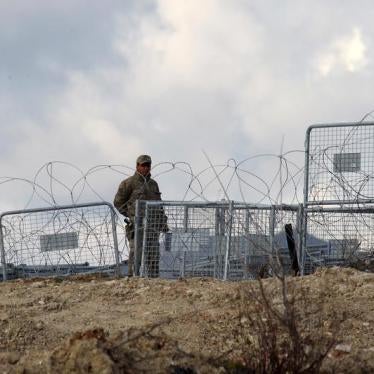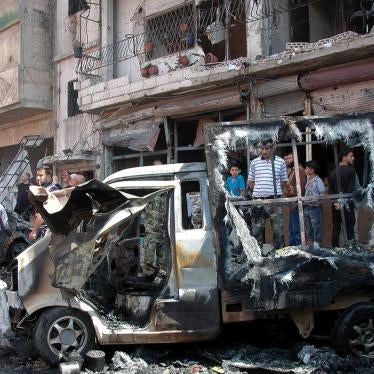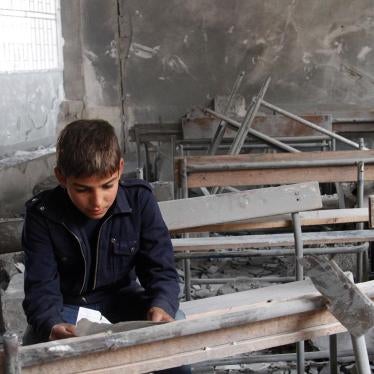The Saudi Arabia–led bombing campaign in Yemen is off to a dreadful start, at least when it comes to the civilian toll. During the first week of military operations against Houthi fighters, the Arab coalition’s warplanes struck heavily populated areas in the capital, Sanaa, and other civilian centers. Dozens of civilians, including children, died in the strikes. According to the World Health Organization, since the beginning of the conflict, 643 people were killed and 2 226 injured in the overall fighting. Meanwhile, Human Rights Watch, where we work, has found no evidence of military targets that could justify the heavy toll in the March 30 strike on a well-known displaced persons camp in Mazraq (Northern Yemen), where 29 civilians were killed and 41 wounded, including 14 children and 11 women.
When the United States announced that it would provide logistic and intelligence support to Operation Decisive Storm, it became associated with the war. Depending on interpretations of international law, it may have legal obligations to minimize civilian harm under the laws of war. But even if it doesn’t, its close proximity with the campaign should be incentive enough to push the coalition to rethink its tactics.
The stakes are high, since the humanitarian situation is sure to get worse. The International Committee of the Red Cross has, from day one, cited obstacles, including a lack of security guaranties, which have prevented urgent medical assistance from reaching civilians. In the last few days, some aid shipments have made it in to the country, but not nearly enough to address this increasingly complex humanitarian crisis. Going forward, all parties to the conflict will have to get serious about their obligation to facilitate humanitarian access.
Ominously, some of the Arab coalition members have poor records of abiding by the laws of war. There is credible evidence that Saudi Arabia used cluster munitions in Yemen during 2009 air strikes against Houthi forces, leaving behind unexploded submunitions that remain lethal for years. Meanwhile, troops from Sudan, which is part of the coalition, have for years been committing atrocities in Darfur and elsewhere, earning the country’s president an arrest warrant for genocide from the International Criminal Court.
So far, coalition members have been slow to address humanitarian concerns. Coalition spokespeople have not publicly promised to facilitate the delivery of medical aid or ensure safe movement for civilians. Nor have they, when asked, provided a credible legal basis for the strike on the displaced persons camp. A Saudi military official said only that “It could have been that the fighter jets replied to fire,” without providing any evidence to back up his claim.
The Houthis, who have controlled much of northern Yemen since September 2014, also have a poor record when it comes to civilian security. The movement has continued to recruit children, and rebel fighters controlling urban areas have been quick to turn their guns on protesters. On the first day of the airstrikes, Human Rights Watch observed Houthi forces firing anti-aircraft weapons from a residential neighborhood, endangering the local population.
Meanwhile, al Qaeda in the Arabian Peninsula (AQAP), the Houthis’ long-standing opponent, has taken advantage of the lawlessness in southern Yemen to capture the port town of Mukalla. In recent years, AQAP has committed numerous indiscriminate attacks that killed and injured civilians. It has also admitted to recruiting and deploying child soldiers.
Enter the United States. Although it is not a member of the coalition, its support for the coalition may make it a party to the conflict under international law. Last week, an unnamed senior military official told AFP that the United States had offered aerial refueling to coalition airplanes outside of Yemeni airspace as well as intelligence on the location of Houthi forces, but without “providing them with targeting information.”
If, in fact, the United States is directly participating in the bombing attacks, for example by refueling warplanes on bombing missions, it would be obligated to minimize civilian harm and could find itself jointly responsible for coalition violations. Beyond any legal obligations, however, it makes sense for the United States to impress upon coalition members their obligations to abide by the laws of war, including the requirement to only attack lawful military targets and to give civilians, when possible, effective advance warning. If it doesn’t, it will jointly bear the political and reputational stigma attached to military operations that wreak havoc on civilians. To prevent such a perception, the United States should condemn apparent violations when they do occur—something Washington failed to do after the Mazraq camp strike—and press for impartial investigations.
Washington should also make clear that it won’t provide military assistance to any member of the coalition responsible for widespread or systematic abuses, such as Sudan, or again risk being accused of double standards. Finally, the U.S. government, which in the past provided Saudi Arabia with cluster bombs, should urge Riyadh not to use these or other unlawful weapons, such as anti-personnel landmines.
It is important for Washington to recognize that minimizing harm to civilians in Yemen is not only a legal obligation of coalition countries but a crucial element of its purported goal of combating militant Islamist groups such as AQAP, whose popular support is boosted through perceived abuses by the West and its allies. There is no denying that on the civilian front operations have started on the wrong foot. But it isn’t too late to fix things, and the United States can be the one to do it.








